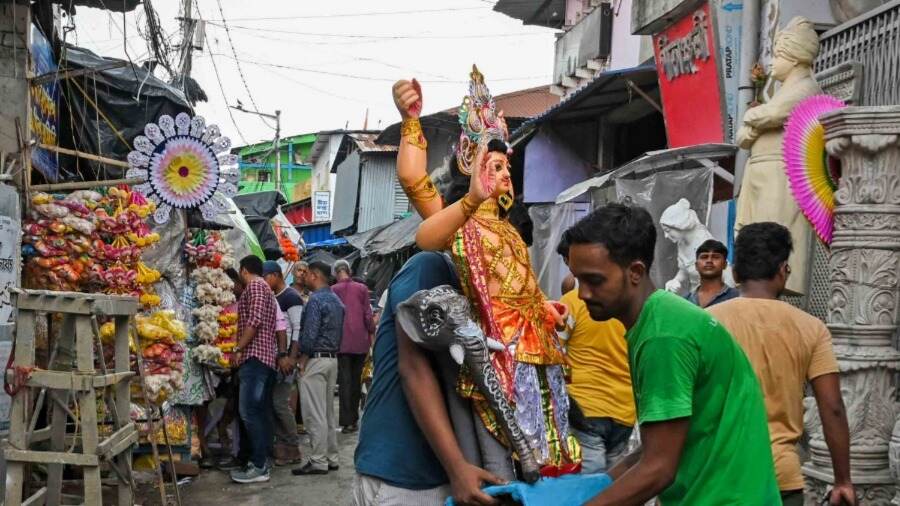The number of Vishwakarma idols, the engineer-architect god of the Hindu pantheon, making their way to factories, jute mills and garages across the city has shrunk in number as the Covid-struck manufacturing industry beset by lay-offs limps back to normalcy.
As society evolves and Kolkata’s services sector expands, Ganesha is slowly taking over with more and more idols of the god of intellect and wisdom being ordered for worship from the sculptors’ lanes as compared to the engineer-god, a favourite for decades for factory workers in this commercial city.
“The demand for idols of Vishwakarma has gone down, while the orders for Ganesha idols have risen in the last few years,” artisan Sanatan Pal told PTI.
Workers of small and big establishments such as factories, motor garages, cycle repairing shops, foundries and engineering firms used to worship the divine architect, Badan Chitrakar, an artisan of Patuapara in south Kolkata’s Kalighat area, said.
“Closure of various units, especially the smaller ones, have resulted in people losing their jobs. A number of units have also become sick over the last few years,” he said.
The situation was aggravated in the past two years due to the pandemic as people from various sectors are struggling to make ends meet, explained Chitrakar, who had been making Vishwakarma idols from his childhood.
“I used to create a large number of Viswakarma idols in the past and did so even after my father’s death six years ago. But the situation is different now,” he said.
People who are continuing with the puja have cut down their budgets and they keep on bargaining. An idol 2.5 feet to 3 feet tall costs around Rs 2,000 to Rs 2,200 but organisers are willing to pay only Rs 1,200 for it, Chitrakar said.
“At one point of time, we used to build huge idols – nine feet to 12 feet in height. Those days are gone,” lamented another artisan Pintu Pal, supporting Chitrakar’s views.
Meanwhile, orders increased for Ganesha idols.
Sociologist Amites Mukhopadhyay has an explanation for it.
The professor of sociology at Jadavpur University said the ones who organise Viswakarma Puja are primarily not the ones who worship Ganesha. Viswakarma Puja is related to people who are associated with blue-collar jobs, while organisers of Ganesha Puja have a business class background and have patrons.
“I believe you will not see many such pujas organised in Sector V (IT hub of Salt Lake near here). I think techies will not go for Viswakarma puja. Mechanics – public transport workers, rickshaw pullers, bus-taxi-auto drivers – the ones who are engaged in manual jobs celebrate Viswakarma puja,” Mukhopadhyay said.
“I think they have created their own space, a very own puja for people associated with blue-collar jobs. This is so because Durga Puja used to be organised by Zamindars and later by members of public libraries or a locality’s club,” he told PTI.
The old grandeur of Vishwakarma Puja is no longer there in many places because of the financial crunch.
“Several bus owners have stopped operating their vehicles. You see fewer buses on the roads these days. People have lost jobs and that effect has trickled down,” Mukhopadhyay explained.
The General Secretary of the Joint Council of Bus Syndicate, Tapan Banerjee, seconded Prof Mukhopadhyay’s observations, saying the financial condition of the workers has become extremely poor.
“Transport workers, even carpenters, used to take leave for two to three days during Viswakarma puja. The spirit has dampened over the last few years due to poor financial condition,” Banerjee said.
Earlier, they themselves raise funds and bus owners used to give them a good amount of money for the celebrations. Now, people are in trouble due to price hikes and “ever-growing rates” of petroleum products, he said.
“More than 60 per cent of buses are off route as of now. The COVID-19 pandemic in the last two years has caused havoc; people are yet to recover from it,” he added.
Some people still organise the puja on a small scale, without the pomp, and it is really very sad, Banerjee said.
